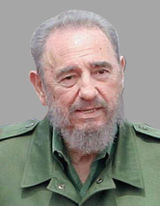Fidel Castro
By pc_valle
@pc_valle (40)
Brazil
November 29, 2006 9:16pm CST
Fidel Alejandro Castro Ruz (born August 13, 1926) is the current President of Cuba. After commanding the revolution that overthrew Fulgencio Batista in 1959, he held the title of Prime Minister of Cuba until 1976, when he became president of the Council of State as well as of the Council of Ministers. Castro became First Secretary of the Communist Party of Cuba in 1965, and led the transformation of Cuba into a one-party socialist republic. As president he also holds the supreme military rank of Comandante en Jefe in the Cuban military. On July 31, 2006, Castro, after undergoing intestinal surgery, transferred his responsibilities to the vice-president, his brother Raúl.
Castro first attracted attention in Cuban political life through nationalist critiques of Batista and United States corporate and political influence in Cuba. He gained an ardent, but limited, following and also drew the attention of the authorities. He eventually led the failed 1953 attack on the Moncada Barracks, after which he was captured, tried, incarcerated and later released. He then travelled to Mexico to organize and train for the guerrilla invasion of Cuba that took place in December 1956. Since his assumption of power in 1959 he has evoked both praise and condemnation (at home and internationally). Castro is frequently described by opponents as a dictator and accused of gross human rights violations, including the execution of thousands of political opponents . Other groups hail Castro as a charismatic liberator.
Outside of Cuba, Castro has been defined by his relationship with both the United States and with the former Soviet Union. Ever since the failed Bay of Pigs invasion of Cuba in 1961 by the United States, the Castro-led government has had an openly antagonistic relationship with the U.S., and a simultaneous closeness with the Soviet bloc. This was true until the collapse of the Soviet Union in 1991, after which his priorities shifted from supporting foreign interventions to partnering with regional socialist figures such as Hugo Chávez in Venezuela and Evo Morales in Bolivia.
Domestically, Fidel Castro has overseen the implementation of various economic policies which saw the rapid centralization of Cuba's economy, land reform, collectivization and mechanization of agriculture, and the nationalization of leading Cuban industries. The expansion of publicly funded health care and education has been a cornerstone of Castro's domestic social agenda. Some credit these policies for Cuba's relatively high Human Development Index rating. Others see Castro and his policies as being responsible for Cuba's general economic depredation, and harshly criticize him for the criminalization of political dissent, free speech, and provoking hundreds of thousands of Cubans into fleeing the country.
What do you think about him? What are your thoughts on dictatorships such as the one we see in Cuba?
No responses





